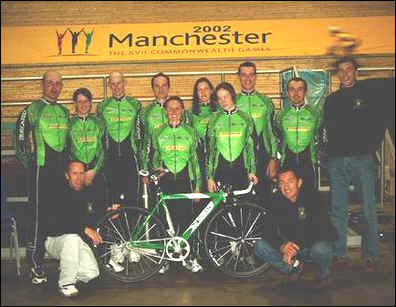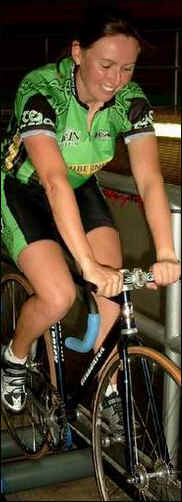Track Cycling Ireland |
|
GETTING BACK ON TRACK Given the lack of a proper track scene here in recent years, it seems somewhat inconceivable that Ireland could have fielded a team in the recent B world championships in Aigle, Switzerland. Track racing had made a short-lived comeback in the Republic some two years ago but since then it has been suspended due to dangerous surfaces at the Sundrive Road facility, a situation which was supposed to be remedied long ago but which has been delayed several times due to unforeseen problems with the tender applications.
That work is expected to be completed later this year, but until then open competition in the area has been impossible. Notwithstanding that problem, a sizeable grant from the Irish Sports Council plus the determination of Cycling Ireland’s track commission made participation in the B world championships possible, enabling a small team of Irish riders to aim for medals and Olympic qualification at the championships.
In other events, Paul Healion crashed in the qualifying round of the points race but nevertheless progressed onwards, along with Paul Doyle. While Healion was a non-finisher in the finals, Doyle ended the race in a solid seventh place. Gillian McDarby and Sara White were fifth and sixth respectively in the sprint events, while Keith Bannan was sixth in the men’s equivalent. But the best result of all came on the final day of competition, ensuring that the squad ended things on a high note and left Switzerland with renewed determination for the future. Louise Moriarty finished ninth in the women’s points race, and while Sarah White crashed out of the same event and Paddy Moriarty and Paul Doyle finished 14th and 19th respectively in the elimination/devil event, a storming ride by Ray Clarke brought Ireland right back up to the front of affairs in the keirin. Riding the discipline for the first time ever, he progressed through the heats, lost out, got back in through the repechage and then rode with great confidence and determination to take bronze in the final, beaten only by Korean specialists Chi Bum Kim and Mun Yong Kim in the final dash for the finish line. ‘It was an absolutely flawless ride by Ray,’ said an elated Phil Collins after the race. ‘I have never seen a guy ride his first keirin and do something like that. I had to explain the rules to him today, yet he was like an old hand out there, doing everything absolutely right. He rode very well to get into the final, and once there, did everything as he should. With four laps to go he was placed in 5th and boxed in. But he muscled his way up on the inside, and after the motorbike pulled away, got up into third and stayed there to get a medal. The two guys ahead of him are very experienced and very quick sprinters but he did a great ride to go out and get bronze. What he did is simply stunning.’ ‘I am pretty confident that when the world rankings are updated next April, his ride will have earned us a place in the Olympics. The two Koreans are almost definitely going to be in the world’s top thirty, meaning that they will automatically get through and the qualification will pass onto Ray. It’s a fantastic result and I am very, very happy.’ Although Irish track racing had a fine beginning with Harry Reynolds landing world championship gold in 1896 and bronze one year later, the emphasis very much shifted to road racing over the years, and it is here where the vast bulk of our cycling heritage and achievements lie. The victories of riders such as Elliott, Kelly, Roche and Earley generated huge press interest and captivated the attention and application of those who might otherwise have built a career around the velodrome boards. Ironically, in terms of Olympic and world championship medals, it has been estimated that it is easier for a country to achieve success on the track, given the greater number of events on offer and the comparatively smaller fields.
Hence the focus of British Cycling on this area. Chris Newton and Paul Manning may have won the FBD Milk Rás in recent years, but their real loyalty is to the track and races such as the 2.5-ranked Rás are simply preparation for velodrome events later in the season. Fortunately, there has been progress on the Irish scene too. A track cycling commission has been set up, chaired by 1996 Olympic pursuit rider Phil Collins, and with Sports Capital funding secured from the Irish Sports Council, the necessary infrastructure should be within place before too long. The delayed resurfacing of the Sundrive Road facility is expected to be finally completed by the end of August while a six-month building of the national cycling school will begin in mid-October. Both should result in a lot of growth in the area, paving the way for a brighter future in track racing in Ireland. Another stepping-stone is the planning, preparation and results from this year’s B world championships. Clarke’s bronze medal and the team’s good showing gives hope and encouragement that the country’s track programme could net some important results in years to come. Besides the gutsy performances exhibited in Switzerland, the dedication and professionalism shown in the weeks prior to the B worlds were particularly impressive. Collins, coach Terry McManus and expert advisor Chris Boardman devised a tough 22 week training programme to get the team into the best shape possible, and backed by funding from the Irish Sports Council’s Athens Enhancement scheme, the squad did everything they could to narrow the gap to the other, more experienced, nations. The climax of the five and a half month plan was the nine days spent at the Manchester velodrome last month, building form and fine-tuning race technique. The result was a highly-intensive training camp which could well be used as a model in future years, for road as well as track teams. Irishcycling.com was fortunate to see the squad in action during this final preparatory period, which is recapped below. Other Pages <Page 1, Page 2, Page 3, Results> <Read More by Shane Stokes Here> |

 The three days of competition brought some good
results for the Irish riders, who were seeking to make up ground on track
specialists through a highly-intensive 22 week training programme. On days one
and two, Irish riders took a spate of top ten placings which suggested that a
longer preparatory period may just have translated into podium finishes in those
events. Ray Clarke was a respectable 7th in the 1 kilometre time trial while
Paul Healion was one place further back in the 4000 metre pursuit. Paddy
Moriarty was listed as 15th, amid confusion caused by timekeepers who had him do
an extra 200 metre lap. Louise Moriarty and Rebecca O’Connell were eighth and
eleventh respectively in the women’s pursuit.
The three days of competition brought some good
results for the Irish riders, who were seeking to make up ground on track
specialists through a highly-intensive 22 week training programme. On days one
and two, Irish riders took a spate of top ten placings which suggested that a
longer preparatory period may just have translated into podium finishes in those
events. Ray Clarke was a respectable 7th in the 1 kilometre time trial while
Paul Healion was one place further back in the 4000 metre pursuit. Paddy
Moriarty was listed as 15th, amid confusion caused by timekeepers who had him do
an extra 200 metre lap. Louise Moriarty and Rebecca O’Connell were eighth and
eleventh respectively in the women’s pursuit.